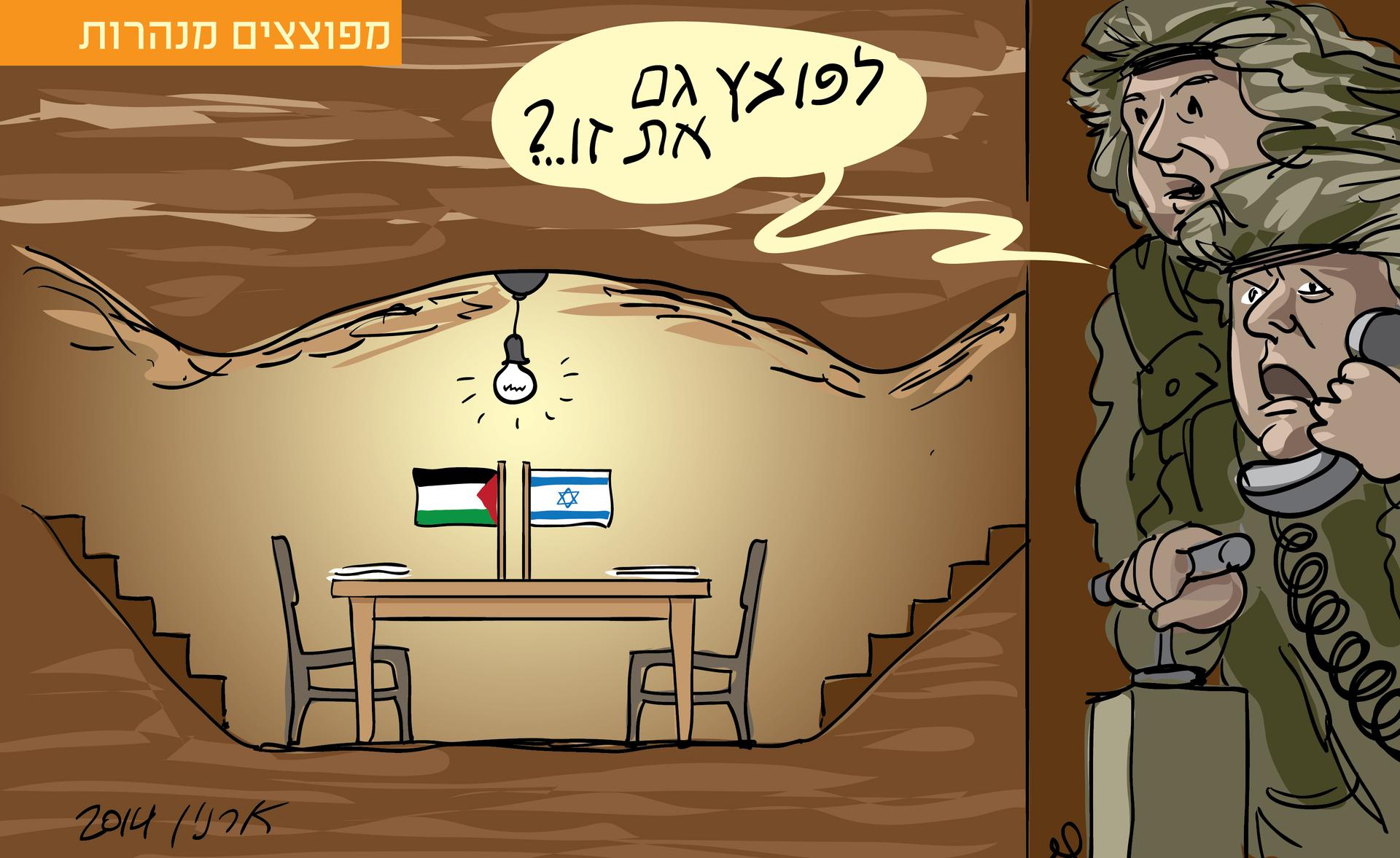Just a mile from Gaza, a Kibbutznik cartoonist holds steadfast to his left wing beliefs
One of the main targets of the Israeli ground offensive into Gaza is the extensive tunnel network which has enabled Hamas militants easy access into Israel. In this cartoon two Israeli soldiers talk to their commander about whether or not to blow up a tunnel which holds a table where negotiators from both sides are intended to sit, the comment being that the incursion into Gaza may destroy any chance of ever negotiating a peace accord.
If you're Israeli and you live just a mile from the Gaza Strip, then the month-long Gaza war and the border violence that preceded it are deeply personal. That's the case for 61-year-old Arnon Avni, a political cartoonist who has spent his whole life in Nirim, a small kibbutz that's within earshot (and occasionally the target of) Hamas rockets. That proximity affects what Avni cartoons about.
"I don't want to be objective. I am involved and I can express it." But Avni says he won't feel boxed in by those Israelis who expect him to cartoon about being a victim. "Many people expect me to be aggressive. As a cartoonist, I don't want to be. I want to say something different, not something expected. I want to say something that has meaning to me."
So a recent cartoon by Arnon Avni shows Israeli soldiers down in the Hamas tunnel network the Israeli ground operation has been targetting. They're radioing to their commander to see if they should destroy a particular tunnel room. It has a small negotiating table with 2 chairs, a Palestinian flag on one side; the Israeli flag on the other. The idea is that the incursion into Gaza may destroy any chance at peace.
Avni has seen rockets first hand. A few weeks ago he rescued a neighbor who'd been injured by a missile. But he comes out of the left-wing ideology of the kibbutz movement. "I am from the left wing and I'm still in the left wing." He's not looking for the Israeli government to protect him. He wants it to protect the Israeli state.
"You have to keep your eyes on the horizon. You have to rely on your imagination and your values and try to understand the situation."
The cartoonist believes many Israelis have fallen into the trap of believing that their enemy, Hamas, is unlike any other. "I think every war makes people say that this kind of enemy is the first in the world. 'We are the first with such a cruel enemy.' With that kind of attitude you can never make peace."
He says Israelis have to adjust their expectations. "People in Israel are too comfortable to go for peace because they know that in order to get it, they will have to compromise with [the Palestinians] which means giving up some of the settlements, some of the things we took from them."
Avni says Israel must take some risks. "You have to be cautious. But sometimes you have to take these risks." But Avni says most Israelis don't want to. "I'm ashamed of it but most of the Israeli side, the religious side, they think we got this country from God and [the Palestinians] are only guests or maybe worse than guests."
Arnon Avni doesn't blame Israeli President Benjamin Netanyahu for the war in Gaza. He thinks that Hamas left him with no other choice but he does believe that Netanyahu stoked tensions.
"He [Netanyahu] brought it on us with stupidity. He persecuted all the activists in West Bank, which is not in Israeli sovereignty, after the three teenagers were kidnapped and killed. He used it to attack all the Hamas people he could lay a hand on."
Arnon Avni has been criticized by some Israelis for taking a liberal position in his cartoons but he's non-plussed. "In my opinions and my personality, I'm very political and very involved with everything. So when people react and attack me, I reply and we talk."
In his kibbutz, Avni has many friends with similar political views. "It's something that we all got from the ideology of the movement that brought us here. The kibbutz movement was always on the left side, sometimes on the extreme left so I'm not alone here with this."
But Avni's views of what's possible have changed. "I think that 20 years ago I was more optimistic about achieving peace. Today, most of the left wing in Israel talk about achieving an arrangement, not peace, because we know that the situation has deteriorated over time. Now it's a little bit naïve to talk about peace, but I'm not giving up on the dream of peace."
Israelis sometimes challenge Avni to suggest a way forward. His response: reconciliation. "I suggest we start the reconciliation with the Palestinian people. I want to us to forgive each other, to start respecting each other. In Israel, they don't respect Palestinians and the Palestinians hate us."
Avni says another way forward would be to recognize the vastly different narratives each people. "In Israel, people think that our narrative is the right narrative so nothing the Palestinians say can be right. I believe both narratives can be right, at least for each people."
Every day, reporters and producers at The World are hard at work bringing you human-centered news from across the globe. But we can’t do it without you. We need your support to ensure we can continue this work for another year.
Make a gift today, and you’ll help us unlock a matching gift of $67,000!
